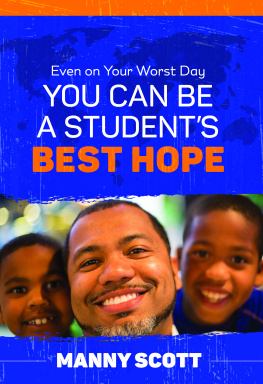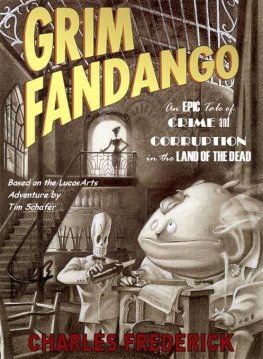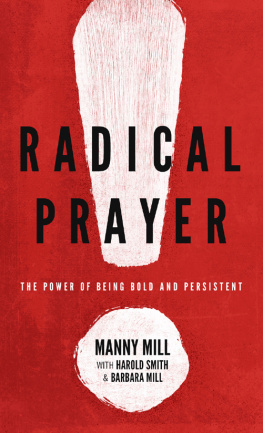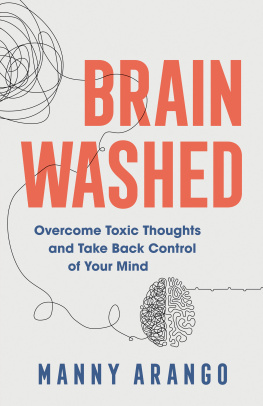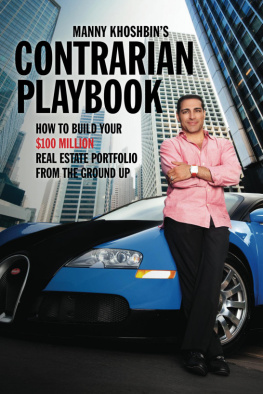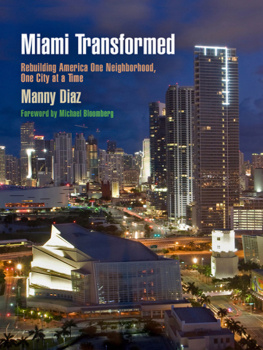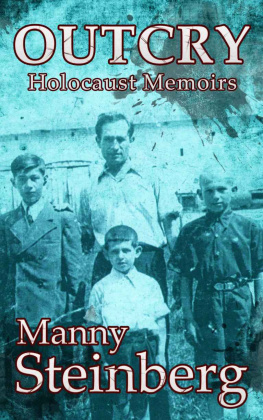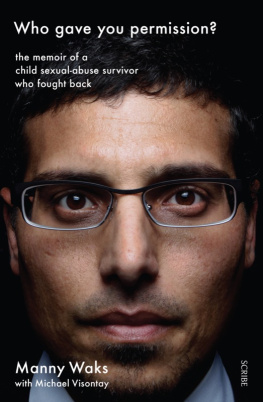Manny Scott - Even on Your Worst Day, You Can Be a Students Best Hope
Here you can read online Manny Scott - Even on Your Worst Day, You Can Be a Students Best Hope full text of the book (entire story) in english for free. Download pdf and epub, get meaning, cover and reviews about this ebook. year: 2017, publisher: ASCD, genre: Religion. Description of the work, (preface) as well as reviews are available. Best literature library LitArk.com created for fans of good reading and offers a wide selection of genres:
Romance novel
Science fiction
Adventure
Detective
Science
History
Home and family
Prose
Art
Politics
Computer
Non-fiction
Religion
Business
Children
Humor
Choose a favorite category and find really read worthwhile books. Enjoy immersion in the world of imagination, feel the emotions of the characters or learn something new for yourself, make an fascinating discovery.
- Book:Even on Your Worst Day, You Can Be a Students Best Hope
- Author:
- Publisher:ASCD
- Genre:
- Year:2017
- Rating:3 / 5
- Favourites:Add to favourites
- Your mark:
- 60
- 1
- 2
- 3
- 4
- 5
Even on Your Worst Day, You Can Be a Students Best Hope: summary, description and annotation
We offer to read an annotation, description, summary or preface (depends on what the author of the book "Even on Your Worst Day, You Can Be a Students Best Hope" wrote himself). If you haven't found the necessary information about the book — write in the comments, we will try to find it.
Manny Scott: author's other books
Who wrote Even on Your Worst Day, You Can Be a Students Best Hope? Find out the surname, the name of the author of the book and a list of all author's works by series.
Even on Your Worst Day, You Can Be a Students Best Hope — read online for free the complete book (whole text) full work
Below is the text of the book, divided by pages. System saving the place of the last page read, allows you to conveniently read the book "Even on Your Worst Day, You Can Be a Students Best Hope" online for free, without having to search again every time where you left off. Put a bookmark, and you can go to the page where you finished reading at any time.
Font size:
Interval:
Bookmark:


Dedication
....................
I dedicate this book to Erin Gruwell, my high school English teacher, who, with unconditional love and unrelenting faith, helped me turn the page and begin writing a new, more fulfilling chapter in my life.
Acknowledgments
....................
Even on Your Worst Day, You Can Be a Student's Best Hope comes out of my life as a student, a teacher, and a speaker. It also comes from all of the people who, in one way or another, have helped me grow into the man I am today.
I would like to thank Dr. Robert Priest, my anthropology professor, who taught me about the power and importance of doing ethnographic fieldwork and cultural anthropology. I would also like to thank Dr. Craig Ott, a mentor and friend, who helped me think more critically about contextualizing communication. My education professor, Dr. James Pluedemann, inspired me to think more critically about how culture influences education and leadership. He introduced me to the tools required to analyze and evaluate the behavioristic presuppositions guiding many schools, and he helped me consider how developmentalism could be a healthier alternative in education. I would also like to thank Dr. Tite Tienou, one of the most inspiring men I know, who taught me to wrestle with theories about ethnicity and identity and their implications for our world today. I also need to express my gratitude for Dr. Duane Elmer for giving me a framework to think about communication in terms of culture.
I would like to express my most heartfelt thanks to the wonderful team at ASCD, who have helped bring this book to life. A few years ago, Genny Ostertag approached me at ASCD's fall Conference on Educational Leadership in Orlando about writing a book to help teachers, principals, administrators, and staff reach and teach more students. However, being in the middle of a 250-day speaking tour while juggling my role as a husband, father, homeschool teacher, and doctoral student, I did not have the time to commit to such an undertaking. Then, at ASCD's 2016 Annual Conference in Atlanta, Genny approached me again, along with Susan Hills, and they both encouraged me to write this book. Their belief in me truly honored me and convinced me to make the writing of this book a priority. Working with Susan on the first draft of the book was a delight, as she helped me to frame what I wanted to say and capture in writing some of my best, most meaningful ideas about helping youth. Finally, Katie Martin, the senior editor on this project, whose love of language enabled her to hear my heart, enhanced my voice and helped to make it sing and sting. For all of the ASCD team, I am so grateful.
I owe my greatest debt of thanks to my wife and children. The unconditional love of my three childrenManuel, Christopher, and Berkeleyand their willingness to share me with the world means so much to me. Hearing their heartbeats and seeing their little smiling faces after a long, hard, and exhausting speaking tour or book-writing session reminds me that the best things in life really are free.
And then there is my dear wife, Alice. When I had nothing but small pockets and big dreams, she was there, believing in me. When I stood on stages all over the world, trying to be a voice for the voiceless, she was there, standing with me. When I wasn't making any money, and I didn't know how we were going to pay our bills, she found a job and supported us for two years and never, ever made me feel like less of a man because of it. When I've been helplessly sick, bed-bound and burdened, she's been there, never complaining, nursing me back to health. When, after giving my all to audiences, I've been empty and exhausted, unpleasant and unavailable, she's been thereevery single timepraying for me, singing to me, keeping the kids quiet for me, loving me back to life. For her, words fail me. For her, thank you is not enough.
Introduction
....................
As I travel around the country, my heart is breaking because I see so many young people who are struggling and in pain. Many of them were born into environments that have instilled in them habits that are smothering their ambition, sabotaging their success, and stunting their growth. Many of them feel hopeless, and I used to be just like them.
My father, whose father never knew him and whose mother never wanted him, has been in prison for most of my life. My mother, whose father disowned her and whose mother abandoned her, was on her own at the age of 16. Enduring things I do not have time to share here, my mother did her best to survive. It was into that world that I was born.
For much of my childhood, my mother made only $5,000 a year. We lived in 26 places before I was 16 years oldnot including the cars, the beaches, the alleys, the hotels, the motels, and the homeless shelters. Sometimes I was so hungry that I jumped into dumpsters to search for food. During those times, I often became so sad that I used to cry myself to sleep at night, drenching my pillows (or the floors of our homeless shelters) with tears and hoping that my eyes would not open the next morning.
I took all of those issues with me to school. My teachers did their best to teach me, but how could I, as a little boy, care about math and integers when my personal life was full of fractures and frictions? How could I care about helping verbs at school when words never seemed to help me at home? How could I care about the different food groups the body needs to be healthy when sometimes I barely had enough food to survive? How could I focus on schoolwork when defending my mother from her crack-addicted, alcoholic boyfriend became a regular part of my home routine? And how could I care about going to school when I wasn't even sure I would have a home to go to at night?
I began spending more of my time in the streets. In fact, every year from 4th to 9th grade, I ditched school 60 to 90 days. I started stealing groceries from supermarkets just so I could have enough food to help me make it through the night. I started smoking marijuana. I started drinking alcohol. I began stealing cars and burglarizing homes. As I look back now, I realize that my personal problems were pushing me down a path that nearly destroyed me.
What made a huge difference were teachersordinary people with extraordinary heartswho entered my world and lovingly guided me through some of the most difficult moments of my life. Because of their help, I was able to break the cycle of infidelity, poverty, and misery that plagued my family for generations. I am now married to a woman who is dearer to me than my own heart's blood. Together, we are raising three beautiful, smart, compassionate, globally minded children. I am the first man in my family (on my father's side) in more than a century to not cheat on his wife or abandon his children. Today, I am a pilot, an investor, an entrepreneur, a homeowner, an ordained minister, and a PhD student. All of this was made possible by the sacrificial, selfless love of teachers and other committed adults.
There are a lot of children in the world today who are living with the pain that I used to have. I can see, like it was yesterday, the face of a boy who stopped me in the hallway after I spoke at his school. He was trembling, and his eyes showed an anguish so overwhelming that he could not speak. After I sat with him for a while, he was eventually able to share with me that earlier that day, he had walked through his front door and found his father dangling from a rope. His dad had committed suicide.
Font size:
Interval:
Bookmark:
Similar books «Even on Your Worst Day, You Can Be a Students Best Hope»
Look at similar books to Even on Your Worst Day, You Can Be a Students Best Hope. We have selected literature similar in name and meaning in the hope of providing readers with more options to find new, interesting, not yet read works.
Discussion, reviews of the book Even on Your Worst Day, You Can Be a Students Best Hope and just readers' own opinions. Leave your comments, write what you think about the work, its meaning or the main characters. Specify what exactly you liked and what you didn't like, and why you think so.

